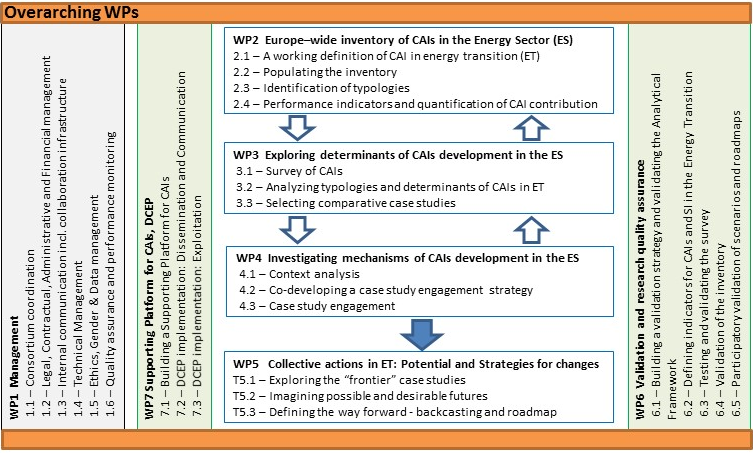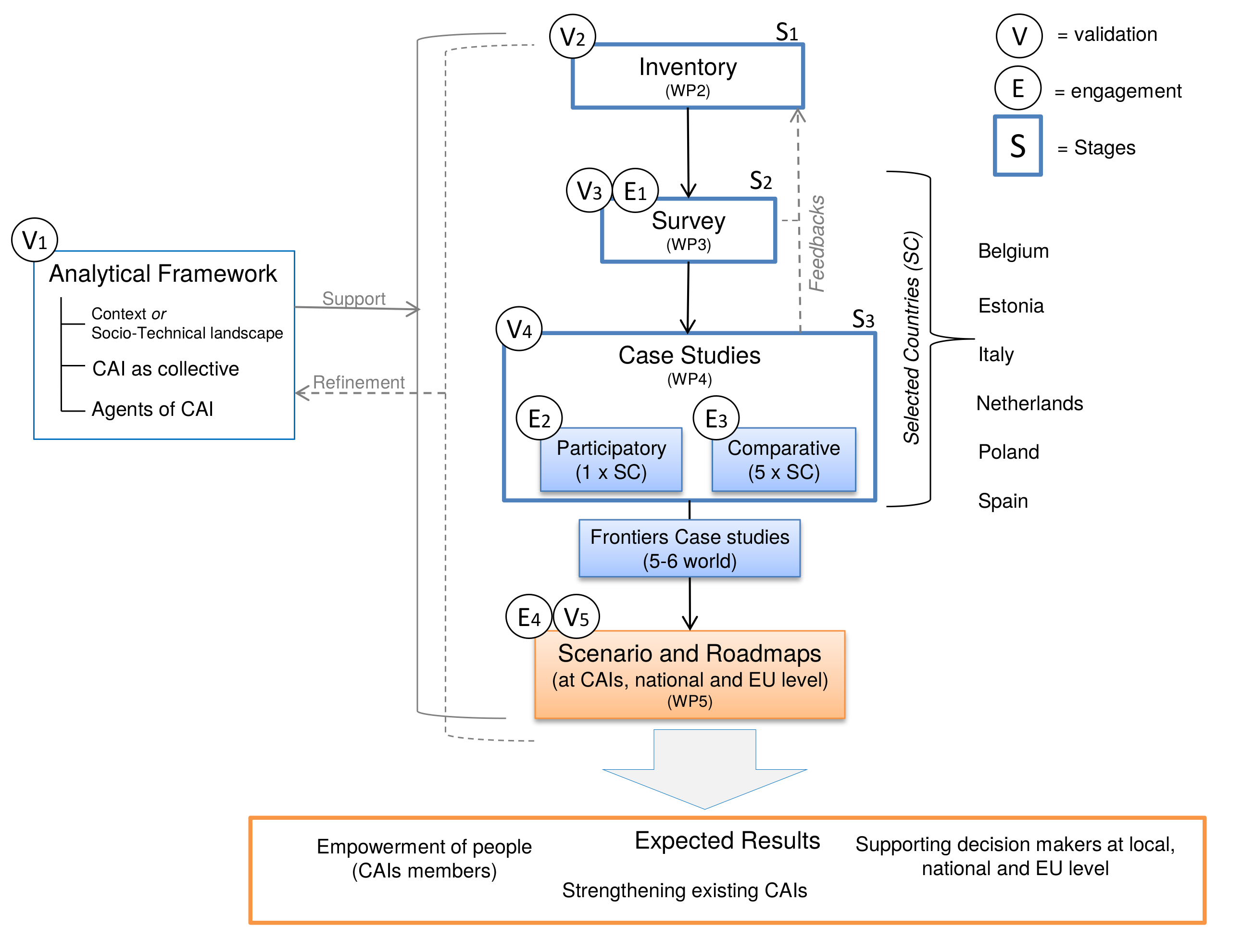Project description
There are large knowledge gaps around the governance of the low carbon energy system transition in a smooth and participative way, ensuring that citizens are at the centre of the required fundamental transformation and enabling the full efflorescence of their creative potential.
COMETS overall objective is to investigate Collective Action Initiatives (CAIs) as the main driver of Social Innovation in the energy sector.
The role of citizen-driven CAIs (e.g. energy communities, cooperatives, purchasing groups) and their contribution to the energy transition has neither been quantified at an aggregate level, nor has their contribution potential been estimated or understood in sufficient depth. COMETS aims to fill these knowledge gaps by quantifying the European-wide aggregate contribution of CAIs to the energy transition at national and European levels by investigating their evolution and scaling up at an in-depth level in six selected countries.
- To build robust knowledge on social innovative processes in the energy transition as implemented by CAIs. COMETS will generate and test new knowledge about technical, institutional, economic, social and cultural factors that may facilitate or hinder sustained activities of CAIs. The project will provide new tools for the assessment of CAIs performance and will provide aggregate estimates of their current and potential contribution to the energy transition.
- To provide tools and recommendations for improving the start-up, steering, and up-scaling of CAI activities. COMETS will co-design the tools with practitioners, enabling changes in the current situation and generating blueprints for future initiatives.
The COMETS work plan is divided into 7 strongly interrelated Work Packages (thereafter WPs) as shown in figure below.
WP1 and WP7 have an overarching role and cover the whole project lifetime. WP1 is aimed at the global coordination of the fulfilment of the activities and to guarantee a strong interaction among the partners, while WP7 is aimed at implementing the Plan for Dissemination, Communication & Exploitation (DCEP). WPs 2, 3 and 4 implement the three stages of COMETS investigation (see Table 1.3), namely the inventory (WP2), the survey (WP3) and the comparative and participatory case studies (WP4). WP5 deals with the co-designing of scenarios and roadmaps for CAIs development in the energy sector and covers also the investigation of few innovative case studies (frontier case studies). Strong engagement of CAI members is carried out in WP4 and WP5, while WP6 groups all the tasks dedicated to the assurance of the quality and coherence of COMETS methods and results
COMETS unfolds along three stages:
- In addition to the elaboration of a working definition for CAIs engaged in the energy sector, Europe-wide data are collected allowing the quantification of the aggregate contribution of CAIs to the energy transition (e.g. installed capacities, people involved, energy services provided, finances invested etc.). Through a cluster analysis, CAI types are derived.
- A survey will be carried out to explore the determinants for energy-CAIs and to identify candidates for in-depth case studies of CAI activities in six selected EU countries: Belgium, Estonia, Italy, Netherlands, Poland, and Spain.
- The third stage focusses on engaging CAI members and local representatives in a process of co-production of knowledge. Altogether, 30 comparative case studies (5 for each selected country) and 6 participatory case studies (1 for each selected country) will be carried out. Different levels of engagement are planned to enable the co-production of knowledge in these case studies.
Comparative case studies: a group composed of representatives from five involved CAIs, national partners and other local stakeholders will form so-called ‘National Research Teams’. They will engage closely with the five CAIs during field excursions. The goal is to develop a joint understanding about the development of these CAIs.
Participatory case studies: CAI members will actively engage in the designing and the conducting of research activities. The goal is to identify the potential for intensifying and/or broadening activities in the future through the joint exploration of scenarios and roadmaps.
In addition, a few selected examples of particularly innovative CAIs from across the world will be explored (‘frontier’ case studies).

COMETS will deliver the following public available results:
- Inventory, to be accompanied by a manual describing data sources, typologies, and validation procedures followed
- Supporting Web Platform for CAIs development
- Reports (in chronological order):
- Validation framework
- Working definition of CAIs
- Evolution of the context and energy sector in six EU countries (Belgium, Estonia, Italy, Netherlands, Poland and Spain)
- Determinants for CAIs in Energy Transition
- Comparative case studies
- Indicators for assessing CAIs performance
- Participatory case studies and engagement strategies for scenario and roadmaps development
- Frontier case studies of social innovation in the energy field
- Scenarios and roadmaps for CAIs development
- Manual – A strategic roadmap for supporting social innovation in the energy sector
- Validation of scenarios and roadmaps
COMETS will positively impact different stakeholders:
- CAIs will be provided with new knowledge, strategies and tools for their development (e.g. guidelines and roadmaps, examples of successful initiatives, information about EU and national regulatory framework and markets, measures to monitor their performance, rural vs. urban applications). CAIs will be also strengthened by the reinforcement of their network with other CAIs, stakeholders and experts at national and international levels.
- Decision makers, i.e. energy agencies and public administrators at local/national levels, will be provided with a wide, user-friendly knowledge base and evidence-based guidelines and strategies. Both guidelines and strategies will provide opportunities and models to spread and sustain CAIs exploitation as a tool for pushing more renewable energy sources, social inclusion, justice and competitiveness in the energy system.
- Citizens will increase awareness and acceptance of energy transition by being involved in some public events in the areas where participatory case studies will be carried out.
- SMEs, even though they will be not be directly involved in the COMETS research activities, are considered as relevant stakeholders in defining strategies and scenarios. SMEs will be facilitated in entering the CAIs development process, e.g. by providing new technologies, consultancy services or funding opportunities.
- CAIs in other sectors, such as food cooperatives or mobility, will have the opportunity, through COMETS dissemination activities, website and supporting platform, to consider the opportunity of integrating the energy domain in their core activity or transferring their model to the energy field.
- The European Commission, and other decision makers, will be able to exploit COMETS results. In addition, they find in COMETS a powerful support tool to pursue some of the objectives of the Clean Energy Package. COMETS will report to the Commission on the progress of implementation of the actions to boost the clean energy transition presented together with this package and suggest new actions as needed.
- The Scientific Community will be able to go beyond the current understanding of collective action in the energy sector, thanks to the massive amount of data, information, methodologies and results that will be provided to the scientific community. Additionally, the scientific community will go beyond the current understanding of collective action in the energy sector due to an updated and evidence-based definition of the determinants that influence CAIs development.
The main expected impacts of the project are two-fold.
Firstly, COMETS will advance the scientific knowledge on the motives, desires, objectives and barriers of Collective Action Initiatives and their historical and future role in the energy transition. Building on the information gathered and tested for its robustness, we will then co-develop and test supportive tools together with CAI members, decision makers and the scientific community.
Lastly, these stakeholders will then be able to exploit the main outputs of COMETS, namely a Supporting Platform for CAIs, the enhanced knowledge base, scenarios and roadmaps for spreading CAI models, even after the project is concluded.
Overall knowledge and scientific impacts
Role of Social Innovation (SI) and Collective Action Initiatives (CAIs):
- An improved, systematic and rigorously tested understanding of social innovation (SI) experiences triggered by Collective Action Initiatives (CAI)
- Identification of enabling or hindering factors for SI (and their uptake); SI targeting the provision of low carbon energy services and/or the saving of energy.
Their mobilization potential:
- An improved understanding of the motivations of CAI to drive SI and of individuals to engage with CAI
- A better understanding of conditions related to social acceptance of the energy transition through the study of CAI and their ability to mobilize people and investments for and in the energy transition
Their application potential:
- Exploration of the potential to develop blueprints for SI realized by CAI to European regions/locations
- Bringing together energy specialists from social sciences and humanities, as well as more technical fields
- Performing research across Europe
Overall societal impacts on innovation & the economy for the energy transition
Energy Union & sustainable energy transition:
- efficiently directing EU and national instruments that support CAIs for clean energy innovation and diffusion and the scaling up of their activities
- increasing energy savings and penetration of RE, low emission mobility, thereby lowering energy dependence
- providing arguments to redirect financial flows towards CAIs active in the clean energy transition
- contributing to a better acceptance of the energy transition
Innovation & economy:
- strengthen bottom-up approaches to innovation
- exploring the right market conditions for SI in the energy transition (innovation & diffusion potential, scaling up)
- use of public resources to support breakthrough, uptake and scaling up of CAIs (e.g. from addressing gaps in financing at earlier stages of the innovation cycle to sustained activities)
- exploring blueprint potential for new and innovative business models for CAIs
Societal:
- supporting the development of open, bottom-up decentralized user-centred energy systems, involvement of open society
- supporting of scaling up CAIs & ensure greater visibility
- increase acceptance of energy transition
- contribution to SDG 7 “Affordable and clean energy” and SDG 13 “Climate Action”
For general information about COMETS: info@comets-project.eu
For specific details coordinator@comets-project.eu

